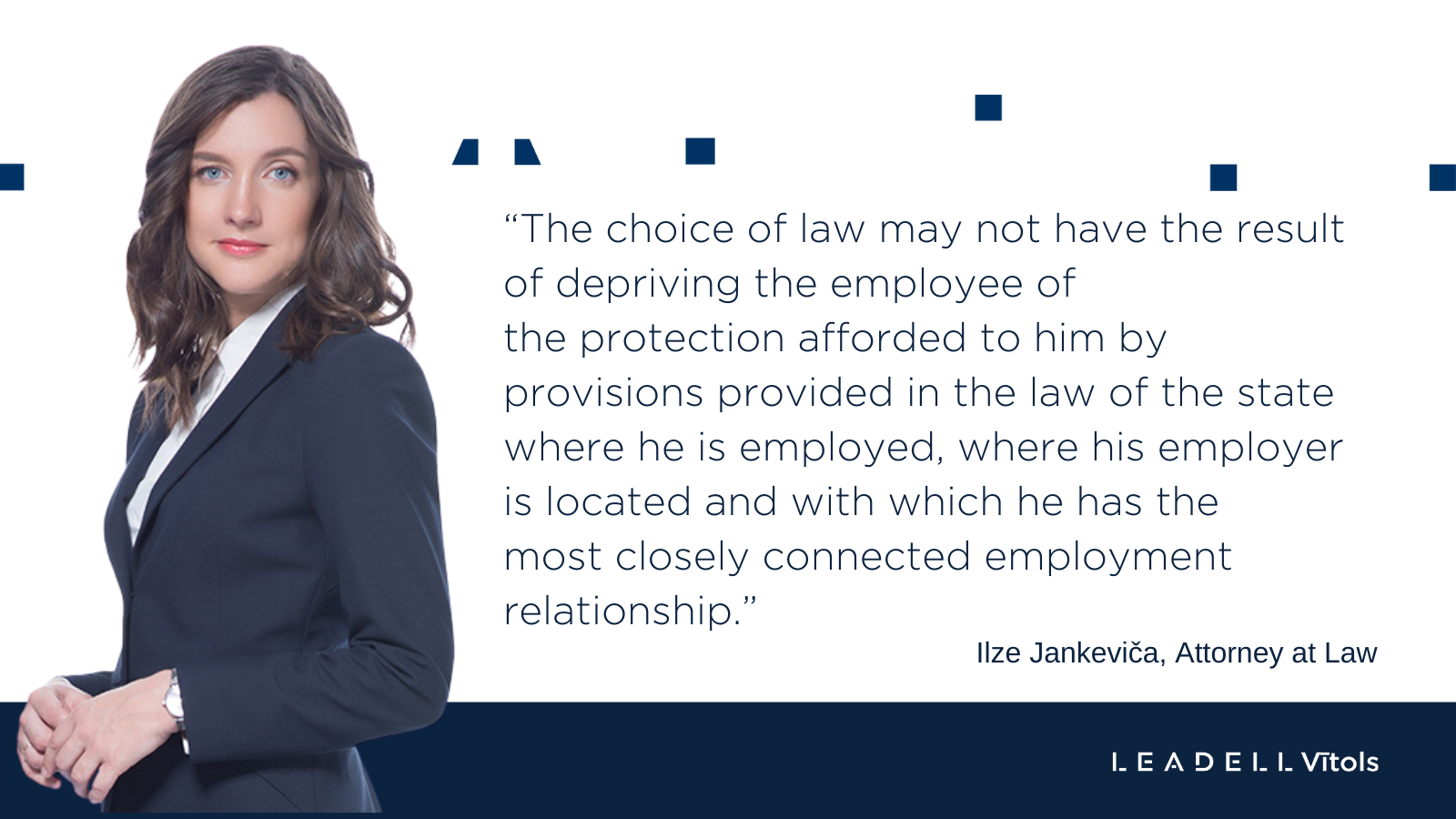News
Alternative information to be included in the employment contract | LEADELL Academy
Continuing the series of articles on the information to be included in the employment contract, in the final article we will look at the information that can be included in the employment contract based on an agreement of the parties.
There are a number of details to be included in the employment contract that are not mandatory, such as the protection of the employer’s information, applicable law, restrictions on competition, processing of personal data, usage of employer’s property and intellectual property rights, nevertheless, these matters can be included in the employment contract if agreed by the parties.
Applicable law
Pursuant to the Labour Law (LL), the employee and the employer may agree on the law applicable to the employment contract and employment relationship. Such an agreement may be relevant if the employment relationship has a cross-border element, for example, a Latvian employee located in Latvia is employed by a foreign employer.

When determining the applicable law, one must take into account both the LL and the principle set in Regulation (EC) No 593/2008 of the European Parliament and of the Council of 17 June 2008 on the law applicable to contractual obligations (Rome I) that choice of law may not have the result of depriving the employee of the protection afforded to him by provisions provided in the law of the state where he is employed, where his employer is located and with which he has the most closely connected employment relationship. For example, if an Estonian employer employs an employee in a company in Latvia, stipulating that Estonian law applies to the employment contract and employment relationship, the employee cannot be deprived of the protection provided by Latvian law.
Protection of information
The employment contract may also include provisions for the protection of the employer’s trade secret and confidential information.
The LL stipulates that the employee has an obligation not to disclose such information brought to their attention that is a trade secret of the employer, as well as to ensure that such information is not available to third parties. The concept of a trade secret is defined both in the Commercial Law which is applicable to merchants, and in the Trade Secret Protection Law which is applicable to a trade secret which is under the control of any natural or legal person. The employer, as the holder of a trade secret, has the duty to indicate in writing what information is to be regarded a trade secret (Section 83 of the LL).
When defining this information, the employer must take into account the requirements that the law imposes on a trade secret, including whether the information has or could have actual or potential commercial value. The list of information to be considered a trade secret may be included in the employment contract or prepared as a separate document, which is presented to the employee upon signing of the contract.
At the same time, it should be taken into account that the employee, within the employment relationship, may also have information of the employer which has no and cannot have any actual or potential commercial value, however, due to various considerations (for example, regulatory requirements, contract terms, etc.), the employer must protect this information. Such information cannot be included in the list of trade secrets, however, the employer is entitled to define it as confidential by including in the employment contract the provisions for the protection of a specific information.
In practice, contracts generally provide that the rules on the protection of confidential information and trade secrets remain in force after the termination of the employment relationship. In addition, one could also agree with the opinion expressed by the sworn advocate Gita Oškāja that the disclosure of the employer’s confidential information and trade secret after the termination of the employment relationship could be subject to a contractual penalty. However, when determining the amount of the contractual penalty, respect should be given for the proportional weight of the infringement.
Restrictions of Competition
An employment contract may also include agreement on restrictions of competition (Article 84 of the LL), i.e. provisions restricting the employee’s professional activities after the termination of the employment relationship. LL provides that such an agreement shall be concluded in writing,indicating the type, extent, place and time of restriction on competition and the compensation to be disbursed to the employee.
As the law does not define the amount of remuneration to be considered appropriate, it must be determined in each case individually, based on, for example, criteria such as the type and amount of restrictions imposed on the employee, the amount of salary, etc.
Processing of personal data
The employment contract may also include information on the processing of the employee’s personal data.
Both when establishing and within the employment relationship, employee’s personal data being is processed (for example, personal data is included in the employment contract, reports submitted to the tax authorities and sometimes data is transferred to customers or service providers).
As the employer determines the purposes and means of the processing of employee’s data within the employment relationship, he is considered the controller within the meaning of Regulation (EU) 2016/679 of the European Parliament and of the Council on the on the protection of natural persons with regard to the processing of personal data and on the free movement of such data. According to the Regulation, the controller must provide the data subject (employee) with a certain amount of information on data processing, such as information on the purposes of personal data processing, legal basis, data retention, data subject’s rights, etc. The employer may provide such information by including it in the employment contract.
Usage of property
In addition to the above, it follows from Article 50 of the LL that the employee has an obligation to treat the property of the employer with due care. Thus, the parties to the employment contract may also include a regulation on the employer’s material values (property), their use, preservation, as well as the employee’s liability. The employer’s property may be assigned to the employee for use in the performance of work duties (for example, a company’s car or a telephone). The employee’s job responsibilities may also include working with material assets (for example, salesperson or warehouse manager working with the goods). In such cases, it is important that there are set procedures in place for the transfer and acceptance of tangible assets, the terms of their use and the employee’s liability. The existence of such procedures is essential in practice in situations where, for example, the property has been used contrary to the interests of the employer, the property has been damaged or lost.
Intellectual property
If the employee’s performance of work duties is connected to intellectual property (invention of intellectual property or author’s work), the employment contract may include provisions governing the respective legal relations between the parties.
For example, it follows from the Copyright Law that if an employee has created a work (except for a computer program) while performing duties in an employment relationship, the moral and economic rights to the work shall belong to the employee as the author, but he is entitled to transfer the author’s property rights to the employer. On the other hand, regarding the development of computer programs, the law stipulates that all the economic rights of the author belong to the employer, unless the parties have agreed otherwise.
In practice, in the interests of the employer, employment contracts in most cases contain provisions which stipulate that all of the author’s property rights in the work created by an employee belong to the employer, including remuneration for the transfer of such rights in the employee’s salary.
At the same time, as is clear from Article 40 of the LL, the employee and the employer shall include other information if the parties consider it necessary.
What to do if there are uncertainties or difficulties arising from the employment contract?
If you need help with labour law matters, please contact our lawyer Ilze Jankeviča.
Lawyer Ilze Jankeviča shared her knowledge at the LEADELL Academy. Ilze has in-depth knowledge in the field of labour law and she would be pleased to help you in finding solutions to issues arising from employment relations.
Other articles in series on the information to be included in the employment contract:
https://leadell.lv/en/what-do-you-need-to-know-about-the-parties-and-the-terms-of-the-employment-contract-leadell-academy/
https://leadell.lv/en/is-it-mandatory-to-include-information-on-working-time-leave-and-time-period-for-giving-a-notice-of-termination-in-the-employment-contract-leadell-academy/
https://leadell.lv/en/what-should-be-specified-in-the-contract-regarding-the-employees-occupation-and-remuneration-leadell-academy-2/
Read more LEADELL Academy
Categories
Subscribe to Leadell's Newsletter







